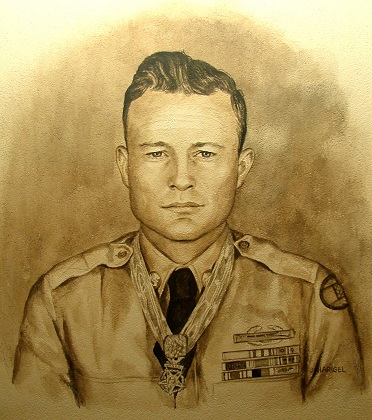
Paul L. Bolden Awarded Medal of Honor
A Vintage Vignette by John P. Rankin
April 30, 2008

Technically, Memorial Day honors the war dead of the United States. Paul Luther Bolden did not die during the war in which he served and was wounded, but he certainly should be remembered as one of our local war heroes. In fact, his life is commemorated in the Veteran's Memorial Park at the corner of Church Street with Front Street along the railroad in Madison. Paul is well remembered by Braly Thompson, a Madison City employee at the Dublin Park Recreation Center, who provided data for this article, collected during their time of working together at Redstone Arsenal.
Paul was born in June 1922 in his parents' house along Farley Road near Hobbs Island Road. His father was Sam Bolden and his mother was Jean Winkles. In May 1945 at New Hope, he married Violet Lorene Alexander, a daughter of Elisha Alexander and Eva Kennemer. Violet was born April 1927 in her folks' house along Hobbs Island Road. Paul's marriage license gives his 1945 residence as Madison, Alabama. Official letters from the War Department in 1947 also show a Madison address for him. He died in the Huntsville hospital after having surgery for a brain tumor. He was in a coma for a week before he past away in May 1979, at the age of 57.
President Harry Truman awarded Paul the Medal of Honor, adding to the other ten awards and medals that he received for his service as a Sergeant in Company E of the 120th Infantry of the United States Army in Germany during World War 2. Madison County courthouse's Hall of Heroes has a large display with Paul's picture along with a summary of his wartime feats. His awards include the Belgium Croix de Guerre with Palm, a Silver Star, a Purple Heart with Oak Leaf Cluster, and several Bronze Stars (one with three Oak Leaf Clusters), among his many service medals. Paul's deeds for which he received the awards read like movie scripts in the citations, perhaps epitomized in the description for his Medal of Honor. It reads as follows:
"Sergeant Bolden voluntarily attacked a formidable enemy strongpoint in Petit-Coo, Belgium, on 23 December 1944 when his company was pinned down by extremely heavy automatic and small arms fire coming from a house two hundred yards to the front. Mortar and tank artillery shells pounded the unit, when Sergeant Bolden and a comrade, on their own initiative, moved forward into a hail of bullets to eliminate the ever-increasing fire from the German position. Crawling ahead to close with what they knew was a powerfully armed, vastly superior force, the pair reached the house and took up assault positions, Sergeant Bolden under a window, his comrade across the street where he could deliver covering fire. In rapid succession, Sergeant Bolden hurled a fragmentation grenade and a white phosphorus grenade into the building; and then, fully realizing that he faced tremendous odds, rushed to the door, threw it open and fired into thirty-five SS troopers who were trying to reorganize themselves after the havoc wrought by the grenades. Twenty Germans died under the fire of his sub-machine gun before he was struck in the shoulder, chest and stomach by part of a burst which killed his comrade across the street. He withdrew from the house waiting for the surviving Germans to come out and surrender. When none appeared in the doorway, he summoned his ebbing strength, overcame the extreme pain he suffered and boldly walked back into the house, firing as he went. He had killed the remaining fifteen enemy soldiers when his ammunition ran out. Sergeant Bolden's heroic advance against great odds, his fearless assault and his magnificent display of courage in re-entering the building where he had been severely wounded cleared the path for his company and insured the success of its mission." (Signed by Harry Truman)